
18 Jan Acupuncture & Natural Treatments for Anxiety
A pproximately 38 million Americans suffer with chronic anxiety or depression. One out of eight adults are currently taking antidepressant medications. While these medications can offer support and benefit on certain occasions, there are indeed many people that do not respond well to this form of treatment. This can be due to a number of factors including:
- Various side effects that outweigh the benefits of the medication
- A developed tolerance to the medication that causes the benefits to diminish
- Excessive sensitivity to the concentrated nature of these medications
- A belief system that suggest that the anxiety is not due to a biochemical imbalance, or that this imbalance is the result of a deeper spiritual issue
Acupuncture
Practiced for over 2,500 years, acupuncture is a branch of Chinese medicine that treats the energetic level of the human body/mind. As surprising as it is to most people, acupuncture is usually a profoundly relaxing experience that establishes a deep quality of restoration and balance to the central nervous system. Most people feel calm or sleepy after treatment. This feeling tends to stick around for a few hours after the treatment and becomes a more continuous experience with repetitive treatment. Studies have shown that Acupuncture affects brain serotonin, which is a chemical that affects a person’s emotional state.
Below are a list of commonly used acupoints to help reduce stress and anxiety. You can apply manual pressure to these points several times a day, or as needed until your symptoms lessen or go away.
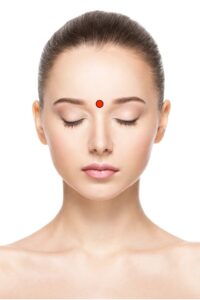
Yin Tang
Yin Tang is located midway between the medial ends of the eyebrows. This point helps to calm the mine and eases anxiety, stress and insomnia. It can also be used for frontal headaches and sinus issues like nasal congestion.
Heart 7
Heart 7 is located in the crease of the wrist, on the pinky side of the wrist. Stimulating this point helps to treat insomnia, anxiety and brain fog. It is also beneficial for physical symptoms like anxiety with palpitations, irregular heartbeat and a racing or pounding heart.
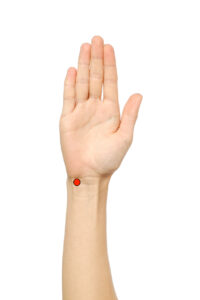
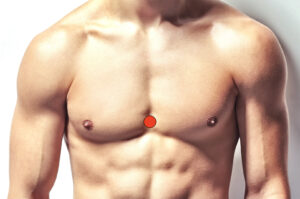
Ren 17
The acupuncture point Ren 17 is also known as the “sea of tranquility”. It is located in the center of the chest, level with the 4th rib space. This point can be used to combat anxiety and stress, and promotes a sense of wellbeing and emotional balance. This point is also beneficial for treating a heavy sensation in the chest that is common with feelings of grief or panic.
Pericardium 6
Pericardium 6 is located 2 inches above the crease of the wrist, between the tendons of palmaris longus and flexor carpi radialis. Stimulating this point helps to relax tightness in the chest, chest pain, palpitations. It can calm nervousness, anxiety and insomnia. It is also beneficial for treating nausea, motion sickness and symptoms of Carpal Tunnel syndrome.
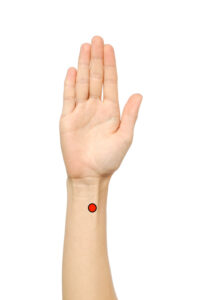
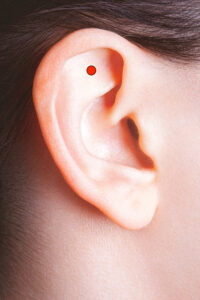
Shen Men
The acupuncture point Shen Men is located in the triangular fossa of the ear. It is considered a Master Point and is used with many other points of the ear for a variety of conditions. It balances the nervous system and has a strong analgesic effect. It has a relaxing effect on the body and helps alleviate stress, anxiety, depression, insomnia and nervousness. It is also used in cases of addiction and detoxification.
Nutrition
One of the most important considerations here is to maintain stable blood sugar throughout the day. The majority of anxiety patients suffer from hypoglycemia. They tend to eat refined carbohydrates and/or drink coffee to start the day, only to experience the typical ‘crash’ around 2-4pm. To keep the blood sugar stable, begin the day with a high protein breakfast such as eggs, legumes, turkey bacon, whole oats, or smoothies with whey protein in them. Eat a low glycemic snack every 2-3 hours. Avoid coffee and other forms of caffeine. It can also be revealing to avoid allergenic foods such as wheat, gluten, pasteurized dairy, and refined sugar for one month to see if the anxiety significantly improves.
Here is a brief list of nutritional supplements that can be very helpful in treating anxiety:
- 5HTP (5-Hydroxytryptophan)
- GABA (gamma aminobutyric acid)
- Fish oil (EPA/DHA)
- B vitamin complex
Many people find meditation and relaxation techniques to be their most powerful allies in healing anxiety. With regular practice of various breathing techniques, good nutrition and meditation, people often feel that they have much more control over their anxiety and that it need not run their life anymore. These practices can be direct gateways to the rest and restore mode of the nervous system. (Interested in learning how to meditate? Here are two great meditation apps that can be downloaded right to your phone or tablet. Simple Habit and Calm)
From a holistic perspective, our symptoms are never random. There is always a reason why they creep up. In the case of anxiety, it is helpful to disengage from our personal feelings about it and look at the bigger picture. What is the anxiety telling us about ourselves and where we are at in life? Is it a warning sign that something is amiss and needs to be acknowledged or changed? In any regard, the practices mentioned here can offer a profound level of support in getting to the root of the problem and inducing a gentle course in a new direction of calmness and insight.



Sorry, the comment form is closed at this time.